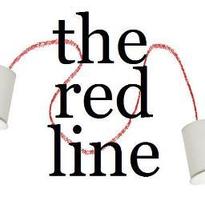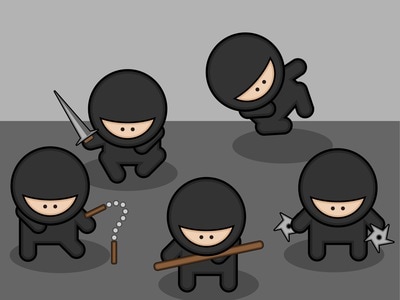| Note: this article was originally published by the online literary magazine The Red Line on 16th May 2015. Since then The Red Line have sadly vanished from cyberspace (although you can click here to read an archived version); however, the article I wrote for them is reproduced below. Additionally, whilst in the process of updating this blog, I surprised myself by stumbling across this earlier blog entry, in which I apparently wrote: "One thing I don’t want to do here is to analyse... what makes a good short story. It’s been done so many times already, not least in the prefaces of the various anthologies I’ve been reading, that this overdose of advanced literary theory has made my head spin." What made me change my mind? I can only assume it was a willingness to lend my own personal take to the issue, having by then been writing short stories for a few years... and also, of course, to take the opportunity to be just that little bit silly... |
Whole books have been written on the craft. Soundbites-a-plenty pop up on social media. You may have heard the one about how “a novel is a film, but a short story is a photograph”. Or Stephen King’s one about how a short story is “a kiss in the dark from a stranger”. There are a million more like it.
Also available for perusal are the introduction pages to many (usually academically-minded) short story anthologies. I’ve seen editors stretch literary theory so much they’ve used pie charts to illustrate whatever point they’re making.
My own personal problem is, whenever I get an excess of complicated or esoteric advice about the right and wrong ways to approach the form, no matter how well intentioned they may be, it makes me want to lie down. Or eat pie. (Or maybe that’s just whenever I see a pie chart.)
I’ll give you an example.
I once submitted a story to a journal I thought would be a good fit for it. They rejected it, but that’s cool. Rejection is an absolute par for the course for any writer submitting their work for publication. What singled this one out was the editor’s candid assessment of my work.
He was ever so good to take the trouble for me; few publications have the time to go to such lengths to support writers in this way. Hence, I didn’t mind when this editor chap called my work “slow-paced, not very interesting and overly long.” Blunt, maybe, but that’s one man’s opinion – I couldn’t argue with it (and, truth be told, he was probably right). I wasn’t sore about him rejecting my work, or his own subjective opinion of it.
What alarmed me was when his comments took an objective turn. “The form,” he wrote, “should sit somewhere between the poem and the novel.” He went on to say that, in a short story, the author “does only half the work” – the other half should be done by the reader, since “that’s the way it’s meant to be”.
I’ll give another example.
One year I entered one of the (many hundreds of) short story competitions in the UK. I didn’t get anywhere; no biggie. But I was intrigued by the judge’s summing up notes. To paraphrase, “so much happened in some of the short stories I read, it felt as if I was strapped to the back of a Ferrari and driven at speed down a wind tunnel”. He went on to imply that short stories should be as minimalist and as stripped down as possible, otherwise they weren’t “true to the form”.
Sure enough, 1st, 2nd and 3rd places in that competition were awarded to slice-of-life stories where very little happened other than the vaguest of shifts in the characters’ viewpoints.
I don’t know about you, but I rather like the idea of a short story which makes me feel like I’ve been strapped to the back of a Ferrari and driven at speed down a wind tunnel.
And that appears to be the crux of it. If I really wanted to get published in the above-mentioned literary journal, I should have sent a concise piece of prose-poetry. If I wanted to do well in that competition, I should have sent a piece of fiction with where almost nothing transpired. (To wit: no Ferraris. No wind tunnels. And most certainly no ninjas. Tragically, this goes against the popular trope that “everything is better with ninjas”, which does make me feel a little sad.)
I would say: no, of course it doesn’t. Maybe that’s not the popular consensus, though.
But interestingly enough, I do half agree with these fellas.
Short stories are, after all, short. All the minutiae of plot and character you would otherwise find in a novel is expunged. For that reason, I’d say the short story form lends itself very well to “letting the reader do half the work”. As it follows, it provides a good opportunity to test the reader by letting them fill in the gaps for themselves. (I’ve read good arguments from writers and critics who actually define the short story form by its ability to do this.)
By its brevity, the short story form also lends itself very well to tales where “nothing much happens”. Subtle stories of this nature are, I would wager, more effective over the course of a condensed 2,000 words than a rambling 80,000.
And should the style of a short story always fall somewhere between a poem and a novel? Well, I suggest a short story does lend itself very well to that. (I couldn’t stomach a whole novel of it. It would be like eating a whole pie. Sorry, there we go with the pies again).
However, I personally maintain there are no universal rules about what a short story can and cannot be. Anyone who says otherwise is merely revealing their own tastes and prejudices.
In summary: my own approach is to forget about rules. Even, when it comes to a first draft at least, to forget about making it any good.
I just kick back and write what I want. The result is often much more likely to be entertaining and engaging. If I’m getting bogged down with the intricacies of the right or wrong way to write a piece of fiction, the whole process gets frustrating. If it's frustrating, I won’t be enthused. This lack of enthusiasm comes across, clear as day. If you as the writer are not entertained or engaged as you write it, nor will the reader be when they read it.
All the best stories I’ve written are the ones I had the most fun writing; it’s no coincidence many of them got published or won prizes. None of them deliberately followed what I would call the “traditional” short story form.
Once I’ve let rip with my first draft, I then, depending on my intentions for it, shape and mould it in the editing process; cut superfluous bits out, sharpen the prose, adjust the storyline and characters according to feedback, whatever. In other words, improve the writing (which is a huge topic in its own right).
I’m now going to finish off my story about being strapped to the back of a Ferrari whilst being driven down a wind tunnel. Then I’m going to search for a market for it. Wish me luck.



